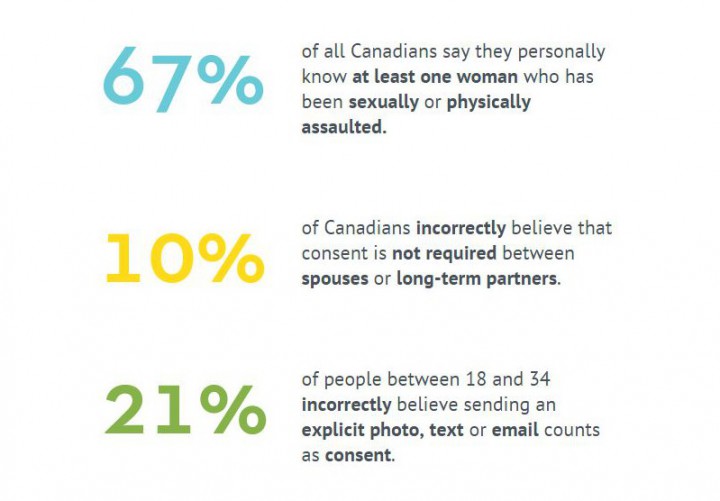MONTREAL – Sexual consent – simple, right?

Not so much: More than two-thirds of Canadians (67 per cent) said they don’t fully understand how it works, according to a new survey by the Canadian Women’s Foundation.
READ MORE: Sex ed 101: How to talk to your kids about the birds and the bees
The online survey commissioned by the foundation polled 1,500 individuals of varying ethnicities, sexual orientations and ages across the country and asked them several questions based on consent, sex and relationships.
While almost all agreed sexual activity must be consensual, 67 per cent said they don’t fully understand how to properly give or get it.
That’s why the foundation created the #GetConsent campaign.
“I think this goes towards debunking more of those myths,” said Anuradha Dugal, the organization’s Violence Prevention Director.
“So, the more we can do to raise awareness about what sexual consent is, we will also go towards helping people understand what sexual assault is.”
What is consent?
Consent is affirmative agreement to every step of intimacy, from a first date, to starting a sexual relationship with someone new to ongoing communication between couples that have been married for years.
Ninety-six per cent of the people surveyed agreed that consent was a must.
READ MORE: Sexual education compared across Canada
While that may seem high, “even that four per cent not knowing if it’s needed is troubling,” Dugal said.
“Ten per cent of Canadians didn’t know it was required between spouses or longterm partners.”
“They may assume that because you’re married, you can’t say yes or no.”
How do we encourage consent?
The first step is to overcome the idea that sex is taboo.
“No one wants to talk about sex, but by not talking about it, well, it’s a dangerous missing link with the conversations we’re having with young people,” she said.
The second step is to figure out why some people think it’s unrealistic to constantly have to give or get consent.
“People don’t understand that consent has to be positive or ongoing,” Dugal said.
“We really want the campaign to nurture a culture of consent so that everybody knows how to give or get consent.”
Consent is all about positive communication – clearly state your intention and not being shy to say ‘no’.
WATCH: The video for #GetConsent
A sexting culture
The survey also shows many young Canadians have a blurred understanding of consent when technology is involved.
One in five Canadians aged 18 to 34 believe if a woman sends a man an explicit photo through text or email, this means she always invites him to engage in offline sexual activity.
Wrong: Sending someone an explicit photo or text only means that person (and only that person) has that photo or text.
Any other sexual activity requires additional consent.
“As we embrace the digital age, it is important that younger Canadians fully understand the meaning of consent and how it applies in both online and in-person settings,” Dugal said.
“Just because a woman shares a sexually explicit photo doesn’t mean she’s interested or willing to engage in offline sexual activity.”
Sex ed in schools
Sexual education in schools is important, Dugal said, because it delves into issues that go beyond the act of sex.
“How do you have a relationship? How do you notice if a relationship is abusive? How do you have communication that’s open and ongoing?” she said.
READ MORE: WATCH: What do students really ask in sex ed? (And how do you answer them?)
Contrary to what many believe, educating students about sex and relationships won’t make them sexually active earlier.
“It’s actually the opposite. They end up talking more about ‘Are you ready?’ ‘Do you know what you’re getting into?’ ‘Are you prepared for the ramifications?'” said Dugal.
“It encourages them to think carefully.”
Dugal said the study has already proven that raising awareness works – now it’s just about making sure all Canadians are clear on what consent means.
READ MORE: Some Quebec schools to start a ‘no exemptions’ sex ed pilot project
“The more we talk about it and break the taboo that sex is something we don’t talk about and sexual assault is shame, I think the more we can say this is about everybody’s safety, the better it will be,” she said.
“We can get to the point where everyone will understand.”
rachel.lau@globalnews.ca
Follow @rachel_lau


Comments